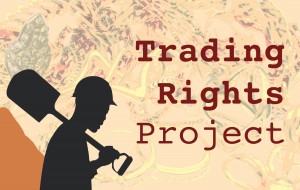Another Empty Report on Human Rights and Trade in Colombia

Image taken from KAIROS Trading Rights Project. For more information, please see click on the image.
On Friday afternoon, June 14, the Canadian government quietly released its second report on the human rights impacts of the Canada-Colombia Free Trade Agreement. In fact, the release was so quiet that even those of us who were anticipating the report since May 15 almost missed it. Rather than submit the report during the regular proceedings in the House, the government left the report with the clerk at the end of the day.
Apparently, the government didn’t want to draw attention to this report, or face the scrutiny of Canadians concerned about the human rights situation in Colombia. You may remember that when the government announced free trade with Colombia – one of worst human rights violators in the hemisphere – there was considerable opposition from a broad range of Canadian civil society groups, including the KAIROS network. Many of you wrote to your Member of Parliament expressing concern about the human rights situation in Colombia and calling for an independent human rights impact assessment prior to the implementation of free trade. The only way the government (a minority at the time) was able to get the deal through Parliament was by agreeing to annual human rights reports. This reporting obligation was enshrined into law in 2010 and was touted by supporters as a meaningful way to ensure human rights accountability in trade. Unfortunately, the report’s content, and the way it was tabled, suggest that this legal obligation is not one the government takes very seriously.
The report itself is so narrowly focused that it is silent on most human rights concerns and, significantly, it avoids any examination of Canadian investment – including oil, gas and mining. Amnesty International has described this 2013 human rights report on the Canada-Colombia Free Trade Agreement as “a human rights report without human rights”. What is most alarming for KAIROS are the human rights concerns from partners and communities living these realities in Colombia that are not at all reflected in the report. For example:
- There is no reference to the increase in threats against human rights defenders, particularly to those working on land restitution and victims’ rights. Many of you responded to the urgent action related to the death threats to 13 human rights defenders (including our partners) on July 13.
- The report is silent on the 35 (out of 102) distinct Indigenous peoples in Colombia who are at risk of extinction, although 89% of crimes against Indigenous peoples and Afro-Colombians occur in mining and oil-producing regions. (see Amnesty and the National Indigenous Organization of Colombia (ONIC) campaign)
- Also absent from this report are the increasing and mounting threats against women human rights defenders who are working to ensure justice and reparations for women victims of violence and human rights violations. In Feb 2013 we issued an urgent action in response to threats to the leadership of Organizacion Femenina Popular (OFP) and their families.
While it is true that it cannot be proven that these human rights abuses are directly related to free trade, the fact that Canada is conducting trade in this context should be reflected in the human rights reports. Also, there is a responsibility to address these human rights concerns, particularly now that the Canadian government is engaged with Colombia in the FTA, rather than forge ahead with trade at all cost.
As members of the Americas Policy Group (APG), we continued to monitor the human rights situation and Canadian policy in Colombia, and look for ways we can respond collectively. The following APG OpEd, Another non –report on human rights and trade with Colombia was published in Embassy Magazine on June 26. We will continue to look for ways to respond as KAIROS and collectively through the APG. Please stay tuned for further action.
For more information, please contact Rachel Warden, Latin America Partnerships Coordinator (rwarden@kairoscanada.org)







